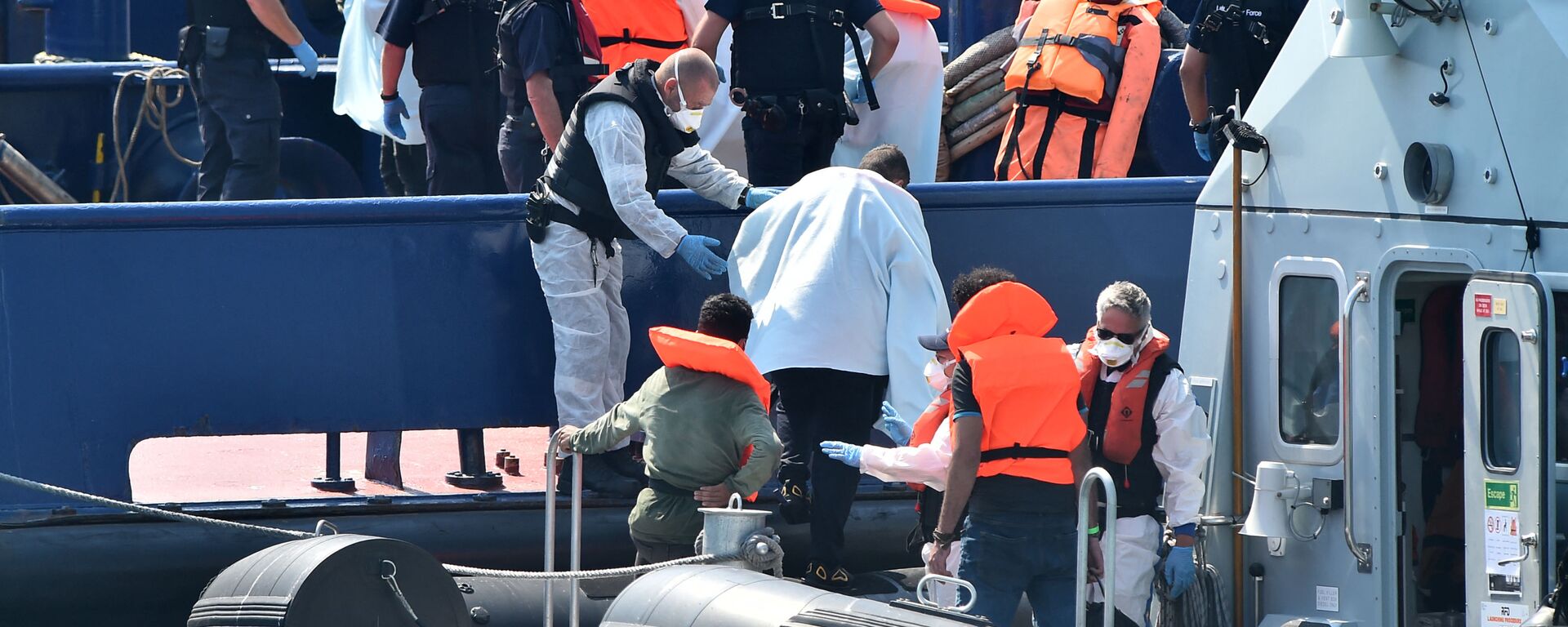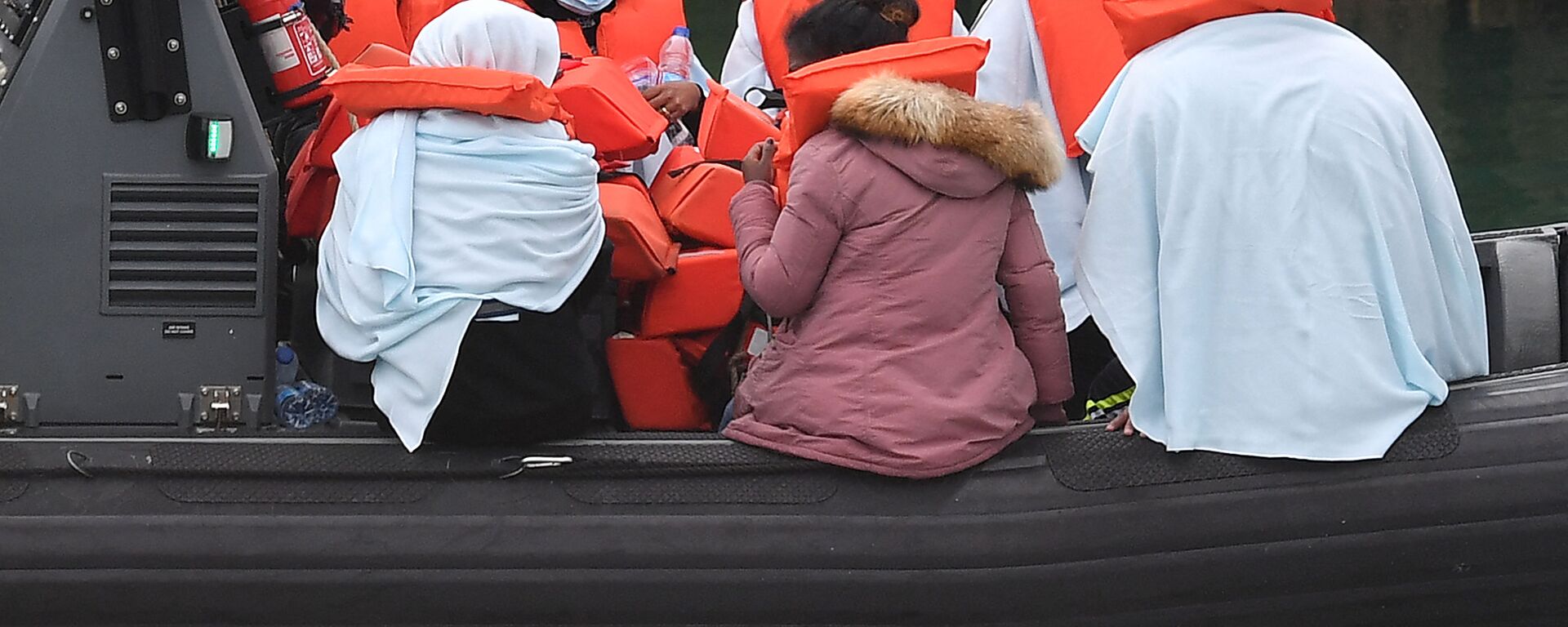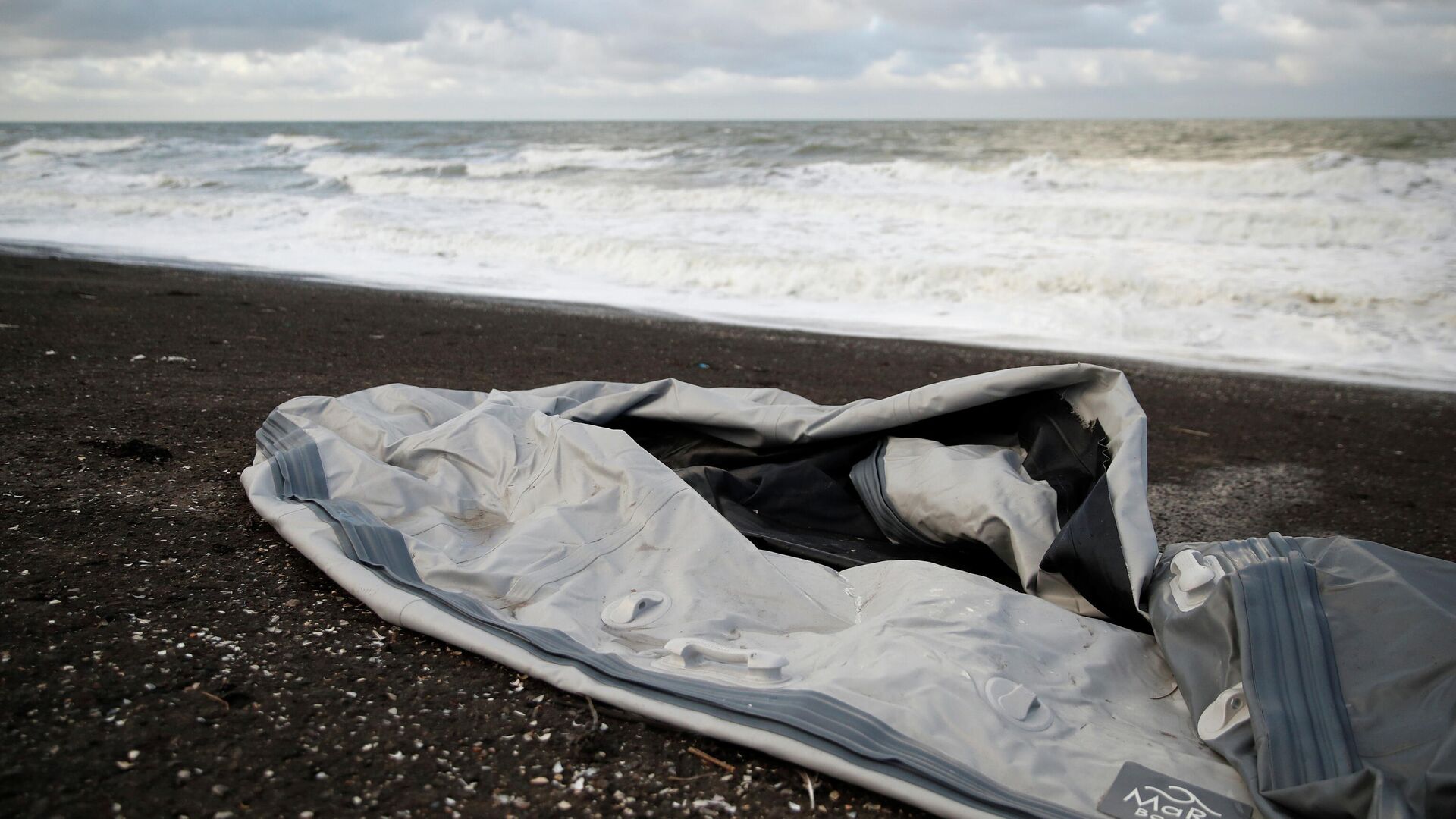https://sputnikglobe.com/20211125/channel-crisis-why-migrants-take-dangerous-routes-to-britain-and-how-it-fuels-uk-eu-tensions-1091017587.html
Channel Crisis: Why Migrants Take Dangerous Routes to Britain and How it Fuels UK-EU Tensions?
Channel Crisis: Why Migrants Take Dangerous Routes to Britain and How it Fuels UK-EU Tensions?
Sputnik International
Migrants attempting to cross the dangerous stretch of water between France and the UK remains a huge problem, which has been compounded by Wednesday's Channel... 25.11.2021, Sputnik International
2021-11-25T16:54+0000
2021-11-25T16:54+0000
2023-05-28T15:17+0000
migrants
english channel
united kingdom (uk)
https://cdn1.img.sputnikglobe.com/img/07e5/0b/19/1091020925_0:160:3073:1888_1920x0_80_0_0_5407f9cd5dff2e0be365516ccd3d8971.jpg
On Wednesday, an attempt by a group of migrants to reach the United Kingdom via the English Channel resulted in dozens of deaths.The tragic incident has triggered back and forth allegations between London and Paris; both sides argue the other is responsible, while the debate rages about what can be done to address the issue. Why do the migrants take the potentially lethal journey?Preferring UK Over FranceIn 2021 so far, more than 25,000 migrants have crossed the English Channel compared to some 8,400 in 2020. Many of them use small boats, which are often inflatable, overcrowded, and completely unsuitable for navigating one of the world's busiest waterways.Migrants who risk the journey often come from countries like Iraq, Syria, Yemen, Egypt, and Sudan, apparently in search of a better life. Despite strict immigration laws in the United Kingdom, many claim asylum as soon as they're picked up by the UK authorities, which means they can stay in the UK but are not allowed to work. Still, according to The Times, migrants are drawn to the UK because it's easier to find informal work on the black market there compared to France.Others also seek to enter the UK due to family ties as they already have relatives living there. Another reason is the language since many migrants aiming for the UK speak English rather than French.Sometimes, however, migrants are not led by reason – instead, they are left to the mercy of people smugglers. According to UK Home Secretary Priti Patel, some migrants have no idea where their smugglers are taking them.Blame GameAmid post-Brexit tensions with the European Union – France in particular – London is making the most of the opportunity to accuse Paris of contributing to the "mass migration crisis."With relations between the countries already tense due to post-Brexit disagreements like fishing rights, the Channel tragedy has triggered a new round of the blame game. While the United Kingdom calls for immediate cooperation and more action from France to ensure that migrants decide against embarking on the treacherous journey across the water, Paris has its own view.French Interior Minister Gerald Darmanin claimed that people are attracted to the UK due to its open-door labour policy for illegal immigrants. UK Prime Minister Boris Johnson, for his part, underlined that French beach patrol efforts “haven’t been enough."He suggested joint patrolling to French President Emmanuel Macron, but France rejected the offer and urged London against "politicising" the issue, emphasising that London and Paris share the responsibility for what happened.Still, the two countries agreed that they need to take joint action to address the problem, with Macron also noting that "stronger European cooperation in this area" is needed because France is a "transit country."'Make Legal Routes Easier'While officials from both countries continue to dissuade migrants from trying to cross the Channel, human rights activists and other observers believe the problem can be addressed by making legal routes to settle in the United Kingdom easier.However, many argue that London and Paris need to cooperate more intensely. According to former UK Border Force boss Tony Smith, the Wednesday Channel tragedy was "waiting to happen" and more will follow unless the French government does not "come to the table" with the UK.Besides, Smith – echoing a statement voiced not only by observers but by the officials from both countries as well – outlined that the industry of human trafficking has to be targeted to stop the problem at the source. French President Macron said that "everything will be done to find and condemn those responsible," with PM Johnson also stressing the importance of addressing the problem of gangs that smuggle people through the Channel.French EffortsIn order to finance border security and tackle the migration crisis, the United Kingdom has pledged to pay France €62.7 million ($73.8 million) under a deal reached in July.In October, however, French Interior Minister Darmanin accused the British government of failing to fully uphold its promise. While some parts of the sum were paid, the UK threatened to withhold further financing if illegal crossings continue to rise.Darmanin argued that France has "succeeded in greatly reducing migratory pressure," noting that the country is "an ally of Britain" but "not its vassal."French Senate revealed that from August 2020 to August 2021, the country made more than 10,000 arrests and spent €217 million attempting to stop the migrant flow. Still, the efforts of the French authorities appear to be largely unsuccessful.Patel's PlanAs the House of Commons discussed the tragedy on Thursday and called for "tough action" to address the Channel crossings, Priti Patel said that she "put every option on the table."A plan to address the migrant crisis in the United Kingdom – the Nationality and Borders Bill – was introduced in the House of Commons back in July with a goal to establish policy on immigration, human trafficking, and seeking asylum in the country, among other issues.Before it was introduced, the Home Office had been promoting its new plan for immigration as "firm but fair" and aiming to make it "easier to remove illegal arrivals with no right to be here," while "supporting those in genuine need via safe and legal routes."Still, as the country faces a serious migration crisis, the bill has not passed through the first chamber and is currently awaiting the third reading.One of Patel's initiatives was to push back refugees using small boats in the Channel who seek to reach the UK. However, it has drawn several legal challenges against her from charity organisations, particularly Care4Calais and Channel Rescue. According to them, Patel's suggestion violates human rights and maritime law. One of the lawsuits against Patel also claims the turnback policy has no legal basis and authorises unlawful conduct by UK officials.Can Migrants Be Sent Back?Under the Dublin III deal with the European Union, the United Kingdom had the right to send back asylum seekers if they had the opportunity to reasonably claim asylum in any other safe country they entered before entering the UK.This deal, however, expired along with the end of the post-Brexit transition period in January 2021.Some argue that a Dublin III-like law is needed to ensure that asylum seekers can only claim asylum in the country they first arrive in. Currently, international law allows them to seek asylum in whichever country they enter.Experts say that the United Kingdom and European Union are in need of a "new agreement" that would outline the policy of joint patrolling and tackling the problem of human smuggling in the post-Brexit reality.
https://sputnikglobe.com/20211119/how-does-british-mass-migration-crisis-affect-uk-france-relations-and-counter-terror-strategy-1090858245.html
https://sputnikglobe.com/20211123/bojo-facing-channel-crossing-dilemma--sending-refugees-to-falklands-not-an-option-observers-say-1090956205.html
english channel
united kingdom (uk)
Sputnik International
feedback@sputniknews.com
+74956456601
MIA „Rosiya Segodnya“
2021
News
en_EN
Sputnik International
feedback@sputniknews.com
+74956456601
MIA „Rosiya Segodnya“
Sputnik International
feedback@sputniknews.com
+74956456601
MIA „Rosiya Segodnya“
migrants, english channel, united kingdom (uk)
migrants, english channel, united kingdom (uk)
Channel Crisis: Why Migrants Take Dangerous Routes to Britain and How it Fuels UK-EU Tensions?
16:54 GMT 25.11.2021 (Updated: 15:17 GMT 28.05.2023) Migrants attempting to cross the dangerous stretch of water between France and the UK remains a huge problem, which has been compounded by Wednesday's Channel tragedy when at least 27 people drowned on Wednesday. So far, London and Paris have failed to find a solution to the problem.
On Wednesday, an attempt by a group of migrants to reach the United Kingdom via the English Channel resulted in dozens of deaths.
The tragic incident has triggered back and forth allegations between London and Paris; both sides argue the other is responsible, while the debate rages about what can be done to address the issue.
Why do the migrants take the potentially lethal journey?
Preferring UK Over France
In 2021 so far, more than 25,000 migrants have crossed the English Channel compared to some 8,400 in 2020. Many of them use small boats, which are often inflatable, overcrowded, and completely unsuitable for navigating one of the world's busiest waterways.
Migrants who risk the journey often come from countries like Iraq, Syria, Yemen, Egypt, and Sudan, apparently in search of a better life. Despite strict immigration laws in the United Kingdom, many claim asylum as soon as they're picked up by the UK authorities, which means they can stay in the UK but are not allowed to work. Still,
according to The Times, migrants are drawn to the UK because it's easier to find informal work on the black market there compared to France.
Others also seek to enter the UK due to family ties as they already have relatives living there. Another reason is the language since many migrants aiming for the UK speak English rather than French.
Sometimes, however, migrants are not led by reason – instead, they are left to the mercy of people smugglers. According to UK Home Secretary Priti Patel, some migrants have no idea where their smugglers are taking them.
Amid post-Brexit tensions with the European Union – France in particular – London is making the most of the opportunity to accuse Paris of contributing to the "mass migration crisis."

19 November 2021, 16:09 GMT
With relations between the countries already tense due to post-Brexit
disagreements like fishing rights, the Channel tragedy has triggered a new round of the blame game. While the United Kingdom calls for immediate cooperation and more action from France to ensure that migrants decide against embarking on the treacherous journey across the water, Paris has its own view.
French Interior Minister Gerald Darmanin
claimed that people are attracted to the UK due to its open-door labour policy for illegal immigrants. UK Prime Minister Boris Johnson, for his part, underlined that French beach patrol efforts “haven’t been enough."
He
suggested joint patrolling to French President Emmanuel Macron, but France rejected the offer and urged London against "politicising" the issue, emphasising that London and Paris share the responsibility for what happened.
Still, the two countries agreed that they need to take joint action to address the problem, with Macron also noting that "stronger European cooperation in this area" is needed because France is a "transit country."
'Make Legal Routes Easier'
While officials from both countries continue to dissuade migrants from trying to cross the Channel, human rights activists and other observers believe the problem can be addressed by making legal routes to settle in the United Kingdom easier.
However, many argue that London and Paris need to cooperate more intensely. According to former UK Border Force boss Tony Smith, the Wednesday Channel tragedy was "waiting to happen" and more will follow unless the French government does not "come to the table" with the UK.
Besides, Smith – echoing a statement voiced not only by observers but by the officials from both countries as well – outlined that the industry of human trafficking has to be targeted to stop the problem at the source.
French President Macron said that "everything will be done to find and
condemn those responsible," with PM Johnson also stressing the importance of addressing the problem of gangs that smuggle people through the Channel.
In order to finance border security and tackle the migration crisis, the United Kingdom has pledged to pay France €62.7 million ($73.8 million) under a deal reached in July.
In October, however, French Interior Minister Darmanin accused the British government of failing to fully uphold its promise. While some parts of the sum were paid, the UK threatened to withhold further financing if illegal crossings continue to rise.
Darmanin argued that France has "succeeded in greatly reducing migratory pressure," noting that the country is "an ally of Britain" but "not its vassal."
French Senate revealed that from August 2020 to August 2021, the country made more than 10,000 arrests and spent €217 million attempting to stop the migrant flow. Still, the efforts of the French authorities appear to be largely unsuccessful.
As the House of Commons discussed the tragedy on Thursday and called for "tough action" to address the Channel crossings, Priti Patel said that she "put every option on the table."
A plan to address the migrant crisis in the United Kingdom – the
Nationality and Borders Bill – was introduced in the House of Commons back in July with a goal to establish policy on immigration, human trafficking, and seeking asylum in the country, among other issues.
Before it was introduced, the Home Office had been promoting its new plan for immigration as "firm but fair" and aiming to make it "easier to remove illegal arrivals with no right to be here," while "supporting those in genuine need via safe and legal routes."
Still, as the country faces a serious migration crisis, the bill has not passed through the first chamber and is currently awaiting the third reading.
One of Patel's initiatives was to push back refugees using small boats in the Channel who seek to reach the UK. However, it has drawn several legal challenges against her from charity organisations, particularly Care4Calais and Channel Rescue. According to them, Patel's suggestion violates human rights and maritime law. One of the lawsuits against Patel also claims the turnback policy has no legal basis and authorises unlawful conduct by UK officials.

23 November 2021, 12:44 GMT
Can Migrants Be Sent Back?
Under the Dublin III deal with the European Union, the United Kingdom had the right to send back asylum seekers if they had the opportunity to reasonably claim asylum in any other safe country they entered before entering the UK.
This deal, however, expired along with the end of the post-Brexit transition period in January 2021.
Some argue that a Dublin III-like law is needed to ensure that asylum seekers can only claim asylum in the country they first arrive in. Currently, international law allows them to seek asylum in whichever country they enter.
Experts say that the United Kingdom and European Union are in need of a "new agreement" that would outline the policy of joint patrolling and tackling the problem of human smuggling in the post-Brexit reality.





